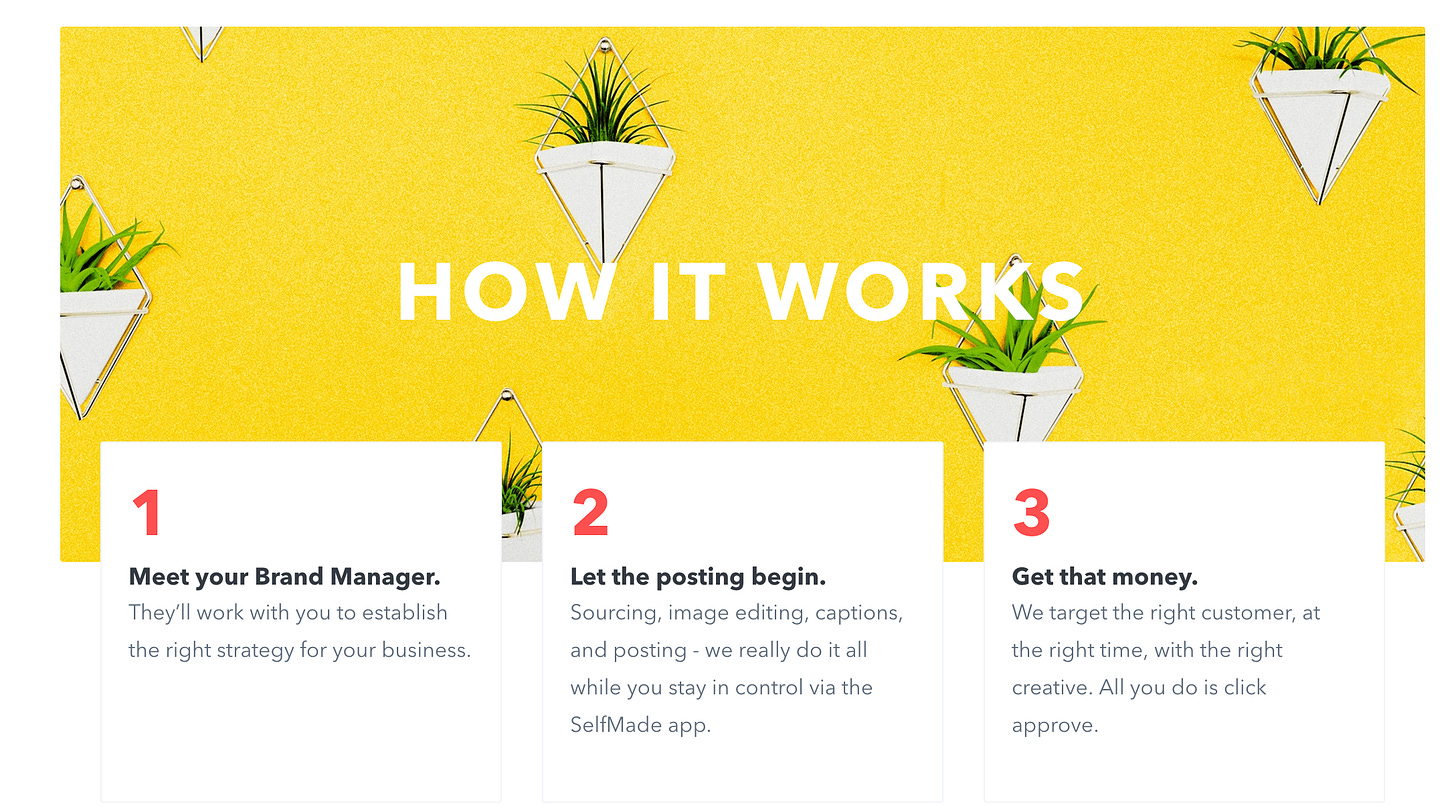🌈 🖼 vol. 32 / transformation and destruction / founders as artists/ atrium for marketing / ++
The profile of a self-transforming mind resonates with the profile of an artist.

Don't walk behind me; I may not lead. Don't walk in front of me; I may not follow. Just walk beside me and be my friend.
— Albert Camus

A close friend shared some diagrams of mental development across our adulthood from Robert Keegan’s 2009 book “Immunity to Change.” The diagrams stuck with me, as they provided the theoretical frameworks to locate my scattered observations.
In the book, the authors describe three plateaus in adult mental development: the development of the socialized mind, the self-authoring mind, and the self-transforming mind. The line gets thinner on the top as fewer people can overcome the last plateau to reach the next one.


The socialized mind is developed through the education system and for many the early years of one’s career. We are told that getting into an Ivy, playing varsity sports, and scoring a high-paying job are considered success, so we’ve strived towards that.
We plateau as socialized mind until we recognized the answers to questions like what matters to me? What keeps me up at night? What feels like play to me but work for others? What is my bottom line? This is the point where a lot of us become known for being “really good at what you do.” We know how to double down on our strengths and optimize productivity. We are high-performing but have also become more attached to this developed identity (or ego), as we start to derive a sense of self-worth from our expertise. Most people recognize they’ve plateaued when they get promoted because they are good at X to a role that requires knowing Y. In tech, it’s common that a killer designer or engineer becomes the design/engineer manager and all the sudden they no longer are great at what they do.
One finally develop the self-transforming mind when we can swiftly switch context and can access oneself or others in relations to different settings. By doing so regularly, we train their minds to look at ourselves and others as objectively as we can without sacrificing their aspiration to make a positive change. The concrete manifestation of the change they want to make is subject to change. The profile of a self-transforming mind resonates with the profile of an artist.
Here’s my favorite quote of all time from one of my favorite writer Albert Camus:
Art is neither complete rejection nor complete acceptance of what is. It is simultaneously rejection and acceptance, and this is why it must be a perpetually renewed wrenching apart. The artist constantly lives in such a state of ambiguity, incapable of negating the real and yet eternally bound to question it in its eternally unfinished aspects.
[…]
The loftiest work will always be… the work that maintains an equilibrium between reality and man’s rejection of that reality, each forcing the other upward in a ceaseless overflowing, characteristic of life itself at its most joyous and heart-rending extremes.
Then, every once in a while, a new world appears, different from the everyday world and yet the same, particular but universal, full of innocent insecurity — called forth for a few hours by the power and longing of genius.
The self-creation requires self-destruction. The world creation requires world destruction. When someone approaches mastery and can no longer prescribe the secret to their successes, it’s because they’ve constructed the world themselves through the diligence of both the conscious and the unconscious, the real and the unreal. The best founders, investors, writers, scientists have all reached this state of consilience.
Below is the estimated distribution of the population that can reach each stage of mental development in 1987 and 1994.

Shockingly, from this chart, it seems like people have become less developed over time.
Fast forward ten years, how is the distribution looking like now? Do we now see more leaders in the self-transforming stage? Or is it becoming ever more comfortable to stay in the stage socialized mind and be blissfully ignorant and unaware as there are more and more realities being prescribed?
I don’t have the data, but I’m guessing the distribution is more polarizing (just like many other things). It’s both easier and harder to identify bias. It’s both easier and harder to be original. It’s both easier and harder to “be oneself.” It’s both easier and harder to be happy at a big corporation.
So now we, feel like we are missing something again, get anxious and ask “how do I get to the stage of self-transforming”? The answer may be as simple as embracing and paying attention to the whole spectrum of being a human and all the possibilities that it evokes — be it envy, sadness, anger, disbelief, anxiety, greed, ambition, hope, love, or despair. We need to confront the truths that lie not in the 1000th book on business strategy, but instead in the changing of seasons, in the confessions of a lost friend, in the smile a mother gives to her child, in the soliloquy of Macbeth.
This may take a while. Start looking now and be patient with what you see.
Stay real,
Tina

SelfMade: Atrium but for Marketing


SelfMade caught my attention, as I spent some time in high school and early college taking pictures and writing copy as a side hustle. One of the problems I had was the volatility of demand, as all my clients came from word of mouth.
Platforms like UpWork have abundant supply, yet the quality is quite low (according to what I’ve heard from past users). Creating a brand and telling a coherent story is higher-leveled skillset that people can easily dismiss. Soon, it will becoming more important as the startup ecosystem is advocating voices of “human” and “authenticity”.
I’m a fan can see more specialized, high quality solutions created as lego-units that make up a business, and it will become increasingly seamless when there are more digitally native brands.
On another note, it’s becoming easier and easier to outsource one part of the business and hand it to someone else. Lambda School just launched its new feature where a company can now pay a Lambda School student to build its product.


Founders or business owners now need to be even more self-aware of their X factor, something that only they can do well, before they outsource the rest. Although I don’t know how a product that’s been outsourced will scale successfully without a bunch of headache afterwards, but we can also argue that it does provide opportunities for outlier talent at Lambda school to shine and can test a product with a much lower cost.

I’ve been raving about VC turned executive coach Jerry Colonna’s book Reboot and have been recommending this to a lot of my type-A high-performing friends.
For those don’t have the time to read, his interview with Tim Ferris was really good".
“Somewhere around 35 to 50 years old, the systems start to break down. The systems that got you out of childhood, that got you into adulthood, that got you established, that got you to the point where you think you got it all figured out. And then all of a sudden, holy shit, the whole thing starts to collapse. Now what do I do? And when I see someone who’s busy, who’s in the early 20s, I see a striver trying to establish themselves. But when I see somebody who’s busy who actually doesn’t need to be that way, I get really, really curious. What internal need is trying to be met by all that busyness? And that’s the place to inquire.”
[…]
“Not only do we put the parts of ourselves that society may say are obviously not good, let’s say a rage-like anger, but also the parts of ourselves that are actually quite powerful, quite positive, and quite lovely. But because they threaten, say, our belonging, they have to actually be put in the shadow as well. Well they too get really pissed off, right? And they too cause trouble. So you might put into the shadow your intellect, or your capabilities, or your ability to write a book, and you might sit for two or three decades, knowing that you want to write a book and not doing it because it might threaten you in some way or another.”
Listening to his words as someone who’s young, restless, doing too much, and very easily get lost in my own head, it’s easily a reminder that THIS will hit me at some point. When we look back on our lives, we realize almost all the clichés that we are told is almost always true, but we won’t really understand til we go through it. This makes me just appreciate the present a bit more. The fact that I still haven’t made it, the fact that my dream is still a bit impalpable so that I can still dream, the fact that I have nothing to lose, can be liberating.

A ‘millennial therapist’ for more than 5 years shared that the # 1 complaint from his clients: “I have too many choices and I can’t decide what to do. What if I make the wrong choice?”
In modern “emerging adulthood” — a term that psychology professor Jeffrey Jensen Arnett defines as “the period between the ages of 18 and 25 when many directions remain possible and very little about the future has been decided” — delayed choices ultimately leads to confusion about one’s identity and purpose in life.
I wrote about how “you can do anything” can be a very scary thing.

A slow community that brings together impact-driven thinkers and makers.
Thank you to those who have reached out wanting to chat. I’m taking the time to get to know each person better, and I believe in quality of relationship over quantity. Meanwhile…
Reply if you want contribute to this or just want to be friends. I’m looking for individuals who are passionate about defining what the future of this community could look like.
That’s it. I love you. 💙
Share with the world if you enjoyed this. 🌍

Twitter / Website / Medium / Instagram




